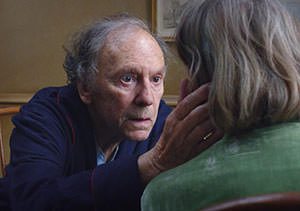A Simple, Excellent and Surprising Film
I think the message of "Amour," if it may be said to have one, is that love is sometimes -- probably rarely -- eternal.I think the message of "Amour," if it may be said to have one, is that love is sometimes — probably rarely — eternal.
If you intend to see “Amour,” and you should, then you should do so before reading this review. Certain dramatic details are revealed below in order to explore the film’s deeper meaning.
As Michael Haneke’s “Amour” opens, Georges and Anne (Jean-Louis Trintignant and Emmanuelle Riva, both superb) are French music teachers in their 80s who return happily from a concert to their loving lives. The next morning, however, she suffers a stroke and is hospitalized. When she comes home, she makes him promise never again to place her under institutional care. He begins nursing her at home — and makes a patient, uncomplaining job of it, as her decline proceeds apace.
That’s all that happens in this quite beautiful film, which is essentially a compilation of minor events. People (notably Isabelle Huppert, playing their daughter) drop in for visits, though eventually Anne refuses to see them as her appearance fades. There are incidents, benign and not so benign, with the nurses Georges hires to spell him, but mostly the movie consists of him feeding her, bathing her, doing her hair. You would not think this amounts to much — and maybe it doesn’t — but such is the intimate power of Haneke’s camera that these interactions exert a sort of hypnotic force on the film. Somehow, you are never tempted toward impatience with “Amour.” And it is a very tender movie.
Until, all of a sudden, it is not. At a certain point, when Anne’s decline has reached a level of near total incomprehension, Georges grabs a pillow and suffocates her. There is no preparation for this act of violence, no foreshadowing. It simply comes out of nowhere. And we don’t know whether it is an act of love or an act of rage. Stunned at first, we come to realize that it was inevitable, that the whole film was preparing us for this event.
This is the reason for the spoiler alert above. You cannot talk intelligibly about “Amour” without reference to the event. It is, by no means, the climax of the film, though it is obviously its dramatic high point. Georges stays on in the apartment, with Anne laid out prettily in her bed, while he awaits discovery. There are a couple of amusing incidents involving an intrusive pigeon (of all things) and then, improbably yet persuasively, the film veers toward a happy ending. Suddenly Anne is restored to health and vigor. This is fantasy, of course, but there she is, bustling about, preparing to go out for a walk with Georges, reminding him to take his coat.
I think the message of the film, if it may be said to have one, is that love is sometimes — probably rarely — eternal. If that’s true, “Amour” does not state it with particular good cheer. It is an objectively observant film, which is greatly to its credit. And it is an impeccable film. That is to say, it never raises its voice, never grows hysterical no matter how increasingly dire the circumstances the couple confronts become. What it’s saying, I think, is that our inevitable, inescapable final crisis is life’s endgame, the business of conducting someone we love to the end of life (in the process of which we must inevitably confront our own mortality). What is singular about “Amour” — pretty much unique in the annals of cinema in my experience — is that it does so with such calmness. There is no question in my mind that when they leave their apartment (a very handsome, indeed enviable, place) for the last time, they are crossing over into eternity, where possibly their love will love on — eternally. I don’t happen to think that’s a possibility, curse my rationalism. But, for the moment, it is a pretty thing to think. And this limpid, almost perfectly executed, film, if it does not save a perfectly wretched movie year, at least stirs some faint hope. Simple is good and excellence is, albeit rarely, attainable.
Your support matters…Independent journalism is under threat and overshadowed by heavily funded mainstream media.
You can help level the playing field. Become a member.
Your tax-deductible contribution keeps us digging beneath the headlines to give you thought-provoking, investigative reporting and analysis that unearths what's really happening- without compromise.
Give today to support our courageous, independent journalists.








You need to be a supporter to comment.
There are currently no responses to this article.
Be the first to respond.